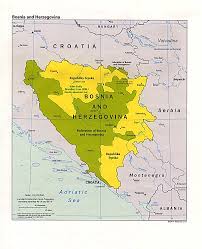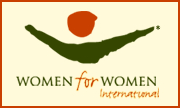The Other Side of Women for Women (Bosnia), a partner MFI of Kiva.org
August 29, 2009
As time goes by in my work as a Kiva Fellow, I realize more and more how important the social mission of an MFI is. At my first placement, I was greatly impressed by Kiva’s partner in Bosnia and Herzegovina. I would like to share the story of this institution. Through Kiva, the relationship and the space for the borrower’s voice is not established solely because of technology, but because of the real person-to-person communication that an MFI has with its clients. If the MFI atmosphere and staff are personable and human, the clients truly feel that they are not just borrowing money from a bank. This is where the borrower really has a space. This is where real healing and real help happen.

“War is not a computer-generated missile striking a digital map. War is the color of earth as it explodes in our faces, the sound of child pleading, the smell of smoke and fear. Women survivors of war are not the single image portrayed on the television screen, but the glue that holds families and countries together. Perhaps by understanding women, and the other side of war…we will have more humility in our discussions of wars…perhaps it is time to listen to women’s side of history.”
—Zainab Salbi, President and CEO of Women for Women International
When I found out that Zainab Salbi was coming to Sarajevo and the regional managers of Zene za Zene were attending her talk, I decided to go on the 3-hour-long ride to the capital of Bosnia and Herzegovina in hopes to find an inspiration. Zainab’s talk proved to be eye-opening.
With a sensitivity and apparent interest in every person present, she talked about her story and what motivates her and asked each individual in the room, mostly women, to tell the others something about herself. The energy that ran through the colleagues as they stood up, in addition to their slight nervousness, was impressive.
The Bosnian branch of Women for Women International (WfWI) is the first one and the stepping stone of the larger organization. On June 12, 1993, with only 30 women, WfWI started because of war-time rape camps in BiH. Now the organization serves 53,000 women annually (including microcredit) and has served 207,000 women directly while mobilizing 250,000 women in 101 countries. This half a million is comprised of both people who donate and the ones who need help. All of these women are asking for justice.

Zene za Zene has sister offices in Afghanistan, Congo, Iraq, Kosovo, Nigeria, Rwanda, and Sudan; all branches zealously follow the mission of WfWI. What distinguishes WfWI is that the organization stresses the holistic approach needed to help struggling women. Microcredit is far from the only solution to the difficulties of every woman in the world. In addition to financing entrepreneurs, WfWI educates women about their rights and connects them to the public and private sectors to give them an opportunity to gain politically important roles. Through organic farming programs and job placements, WfWI addresses the non-entrepreneurial women who need assistance. In job placements for their program participants, WfWI defends the need for rights awareness, fair wages, and fair labor practices. “Placing women in jobs is not unique, but placing women who know their rights and can mobilize is,” says Zainab. Through the programs of WfWI, participants acquire skills, create friendships, raise their self-confidence, and familiarize themselves with their rights. The combination of financial support, a community, and access to knowledge and resources brings a lasting change in these women’s lives.
If you feel inspired to support the mission of Women for Women International, please visitwww.womenforwomen.org. In 2009, due to the economic changes in the world, donations have dropped by 10% and WfWI has had to cut $3 million of spending and 17% of their staff. Even when sponsors ‘drop out,’ the organization cannot suddenly stop financing the women in need. Now is the most important time to donate for this cause and make sure that no branches have to be closed, so that Women for Women International can keep uplifting as women all over the world.
If donating is not a good alternative to microcredit for you, you could lend to borrowers of the MFI Zene za Zene. Kiva.org partners with microcredit institutions that have a strong social mission and allows you to give a hand to entrepreneurs all over the world. The 90% repayment rate should show you how safe it is to invest in Kiva borrowers.
This post has been written by Velizara Passajova, a Kiva Fellow working for 4 weeks at her second placement in Armenia (withNor Horizon). Check out currently fundraising loans in Eastern Europe and join Kiva Lending Team – Friends of Women for Women International or Armenia.
/>














